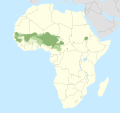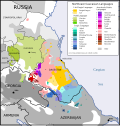In linguistics, an allomorph is a variant phonetic form of a morpheme, or in other words, a unit of meaning that varies in sound and spelling without...
10 KB (1,209 words) - 16:11, 19 May 2025
In morpheme-based morphology, the term null allomorph or zero allomorph is sometimes used to refer to some kind of null morpheme for which there are also...
3 KB (355 words) - 21:52, 1 July 2023
in astronomy's Hertzsprung–Russell diagram 0 allomorph, also null allomorph, a special kind of allomorph in morphology which has the form of a null morpheme...
849 bytes (153 words) - 08:16, 7 October 2023
onset. In morphology, a zero morph, consisting of no phonetic form, is an allomorph of a morpheme that is otherwise realized in speech. In the phrase two...
4 KB (476 words) - 07:59, 5 July 2025
ʿnd, ḥt, ʿkdy a subjunctive in -a t-demonstratives leveling of the -at allomorph of the feminine ending ʾn complementizer and subordinator the use of f-...
151 KB (14,256 words) - 06:17, 28 July 2025
Pseudomorph (redirect from Allomorph (geology))
Corocoro United Copper Mines of Coro Coro, Bolivia. A paramorph (also called allomorph) is a mineral changed on the molecular level only when the structure of...
6 KB (763 words) - 03:06, 12 January 2025
Morpheme (section Allomorphs)
Allomorphs are variants of a morpheme that differ in form but are semantically similar. For example, the English plural marker has three allomorphs:...
18 KB (2,032 words) - 08:32, 18 July 2025
enclitics have allomorphs with apocopated final vowels (e.g. /‑še/ ~ /-š/) suggests that they were, on the contrary, unstressed when these allomorphs arose. It...
278 KB (32,395 words) - 23:48, 1 July 2025
Allometry (redirect from Allomorphism)
Allometry (Ancient Greek ἄλλος állos "other", μέτρον métron "measurement") is the study of the relationship of body size to shape, anatomy, physiology...
48 KB (6,465 words) - 05:45, 12 June 2025
between р- and т-, the allomorphs beginning in т- are used after stems ending in the dental sonorants -р, -л and -н. The allomorphs beginning in р- occur...
94 KB (8,234 words) - 14:30, 10 July 2025
the prefix allo- (other, different), such as allophone, allograph, and allomorph. The first emic unit to be considered, in the late 19th century, was the...
5 KB (659 words) - 02:39, 5 May 2025
takes the vowel harmonic allomorph -앗 -as after verb stems whose (final) vowel is yang: In certain cases, suffix allomorphs do not match the harmonic...
172 KB (15,075 words) - 19:16, 17 July 2025
allophones and allomorphs of a language's phonemes and morphemes and to develop analyses determining the distribution of those allophones and allomorphs. The term...
7 KB (639 words) - 22:55, 8 July 2025
of +, −, or ⎓ for direct current. The tilde may indicate alternating allomorphs or morphological alternation, as in //ˈniː~ɛl+t// for kneel~knelt (the...
75 KB (8,234 words) - 09:30, 13 July 2025
example, lata (meaning ‘kick’) adds the allomorph -it to become lat-it-o (meaning ‘kick back’). The allomorphs -t, -it or -ut are added to a verb to make...
36 KB (2,664 words) - 14:20, 18 July 2025
ʿnd, ḥt, ʿkdy a subjunctive in -a t-demonstratives leveling of the -at allomorph of the feminine ending the use of f- to introduce modal clauses independent...
29 KB (2,327 words) - 22:49, 28 May 2025
suffixes mark which speech level. Several formal-level markers have an allomorph beginning with su- after consonants, reflecting their origin as a compound...
32 KB (2,567 words) - 08:46, 28 July 2025
Personal pronouns in Portuguese (section Allomorphs)
The Portuguese personal pronouns and possessives display a higher degree of inflection than other parts of speech. Personal pronouns have distinct forms...
41 KB (4,476 words) - 20:23, 20 May 2025
some declensions and is increasingly unproductive in colloquial use. Allomorph after vowels Like many Northeast Caucasian languages, Ingush uses a vigesimal...
22 KB (891 words) - 15:15, 3 June 2025
with the subject). Another allomorph, -ŝqa-, occurs before the ending -yki for 1st person acting on 2nd person. A third allomorph, -ŝun, is used in the first...
108 KB (13,892 words) - 11:47, 13 April 2025
morphophoneme within a morpheme can be expressed in different ways in different allomorphs of that morpheme (according to morphophonological rules). For example...
48 KB (6,178 words) - 14:57, 21 May 2025
this alternation, but later forms of Classical Arabic levelled the /a/ allomorph: Islam portal Arabic in Islam Quranic Arabic Corpus Arabic–English Lexicon...
28 KB (2,478 words) - 20:18, 22 July 2025
morsitation, premorse, remorse morph- form, shape Greek μορφή (morphḗ) allomorph, amorphous, anamorph, anamorphic, anamorphism, anamorphosis, anthropomorphism...
1 KB (1,327 words) - 16:43, 17 March 2025
depending on whether the noun is a proper noun or a common noun. Si is the allomorph used when the noun is a proper noun or a kinship term; ka is used when...
9 KB (936 words) - 23:04, 10 November 2024
in word-initial and intervocalic positions usually becomes a "palatal allomorph", and is barely pronounced. Very few Venetic words seem to have survived...
81 KB (6,010 words) - 17:23, 16 July 2025
particles in Samoan, lē and leʻi (sometimes also written as lei). Lē has the allomorphs [le:] or [le]. Lē should not be confused for le, the specific singular...
73 KB (8,009 words) - 07:55, 21 July 2025
(represented by an *H here) was a part of the PIE root; it occurs in all of its allomorphs, for example *bʰuH·tó·s > bhū·tá·s (*bʰeuH- is reduced to *bʰuH- in PIE...
55 KB (4,714 words) - 07:37, 7 July 2025
Barman language (section Allomorphs)
of this language that needs to be mentioned is the presence of allomorphs. Allomorphs of the past tense marker: -ja is the past tense marker. But when...
13 KB (1,059 words) - 09:58, 5 May 2025
Root Allomorphs When after: voiceless nasals voiced/vowel After -л Nominative -∅ Genitive (-NIŋ) -тиң (-tiŋ) -ниң (-niŋ)) -диң (-diŋ) Accusative (-NI)...
32 KB (2,777 words) - 16:00, 27 July 2025
-tom (spelt -twm), or possibly -tum; in Manichaean, they also have the allomorphs -dar and -dom after voiced consonants. For example, abēzag (ʾp̄yck') 'pure'...
187 KB (18,636 words) - 20:01, 16 July 2025















